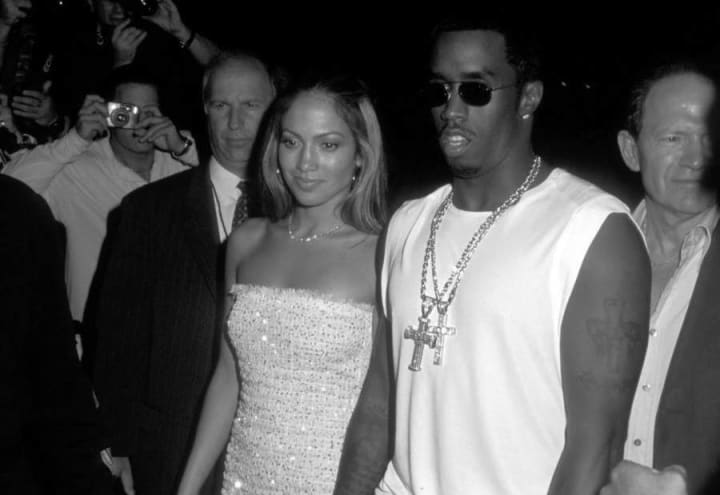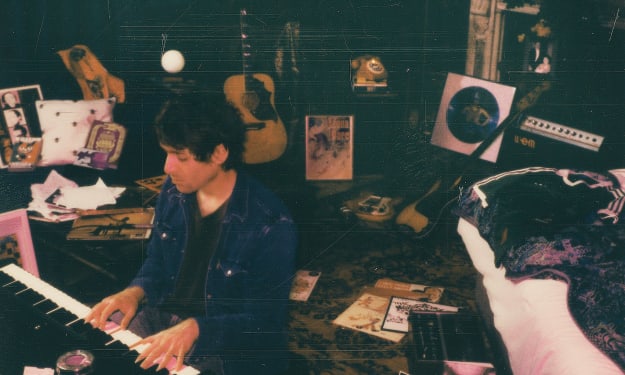We Need to Talk About Jennifer Lopez
The iconic entertainer is facing a tough time in the media and in the public eye - but there's something we have yet to discuss.

Mariah Carey was riding a career high in 2000.
Since her 1990 debut, the multiracial songbird – who proudly celebrates and elevates her Black heritage – had churned out smash hit after smash hit, with 14 of her singles hitting the peak of the Billboard Hot 100 (with five more to follow).
At the time, she held the record for the most consecutive weeks at no. 1, had released two of her most personal works to date – 1997’s Butterfly and 1999’s Rainbow – and finally found herself legally and professionally separated from Tommy Mottola; her former husband, manager, and CEO of Sony Music, which housed, among other factions, Carey’s Columbia Records label.
She had done more than enough to warrant a proper break. Instead, Carey dove head first into a passion project she had postponed for nearly three years: a fictional retelling of her life story for the big screen entitled All That Glitters.
Carey, as she did with most projects, pulled out all the stops, including recording a full soundtrack to pair with the movie. With the film’s narrative taking place during the 1980s, Carey began conceptualizing the album with music from that era. When it came to the lead single from All That Glitters, Carey decided on “Loverboy,” a bouncy, made-for-summer, hip-hop-inspired number. The tune sampled a melody from “Firecracker,” a 1978 single by Yellow Magic Orchestra.
As the 2001 release date for the project drew near, Carey received word of something that shook her to her core: entertainer Jennifer Lopez had also used a sample of “Firecracker” for a track on her then-upcoming album, J. Lo, titled "I'm Real."
Reaching out to the publishers behind “Firecracker,” Carey learned that someone from Lopez’s camp licensed the track one month after she did.
That someone, we would learn in 2002, was none other than Mottola. He had first learned of the sample request through early scenes of Carey’s big-screen debut (the movie was a Sony release, which meant Mottola had full access to the film dailies).
Carey had allegedly been “paranoid” of something like this happening and had been using versions of her songs performed by other singers while filming – but Mottola quickly discovered the ruse.
To make matters worse, Carey knew she was nowhere near done with the soundtrack or film to get a jump on the release. As such, Carey chose to re-record “Loverboy” with a different sample – “Candy” by 80s R&B icons, Cameo - thereby giving the original “Firecracker” sample to Lopez by default.
It would not be the first time something like this occurred. Within a year, Lopez would go after Carey again with a similar move from the same album (more on this later).

Unless you’ve been living under a rock or aren’t as well-versed in pop culture as myself, you most likely know the story of Jennifer Lopez. In her own words, she grew up “running up and down the streets” of the Bronx as a “little crazy girl” with wild, curly hair. Through hard work and determination, she would become a renowned actress, singer, dancer, and full-fledged entertainment powerhouse.
After her star-making turn in the 1997 Selena biopic, it made sense to everyone in her camp to push Lopez into the music realm. Following a “major” bidding war, she was signed to a “lucrative” record deal with Sony and started work on her first album, 1999’s On the 6. The title was a nod to the NYC train line she rode back and forth between her Bronx home and dance classes in Manhattan.
Led by the no. 1 single, “If You Had My Love,” the album debuted in the top 10 of the Billboard 200. On the 6 went on to sell 10 million copies.
As Lopez worked on her first album, R&B singer Chanté Moore was putting the finishing touches on her third - 1999's This Moment Is Mine.
Moore had been growing steadily in the music industry as a gifted vocalist since 1991, first being signed to Warner Bros. Records through talent manager, Benny Medina. Her third LP would go on to feature her biggest hit, “Chanté’s Got a Man,” but there was another album cut Moore hoped would push her career to new heights.
The track, “If I Gave Love,” was an R&B dance banger co-written and composed by Rodney “Darkchild” Jenkins. The Grammy-winning producer had penned major hits for Brandy, Monica, Whitney Houston, Destiny’s Child, and many others.
Hoping to build off the momentum of “Chanté’s Got a Man,” Moore looked to release “If I Gave Love” as the second single from This Moment Is Mine. Unfortunately, fate – and Jennifer Lopez’s camp - had other plans.
Enter Sean “P. Diddy” Combs, the co-producer of Lopez’s On the 6 - and her then-boyfriend.
During a recording session with Jenkins sometime before Moore’s album release, the producer allowed the former Bad Boy CEO to listen to the track he recorded with Moore. After just one listen, Combs knew “If I Gave Love” was bound to be a hit – and he wanted that hit for Lopez.
“I heard that [Combs] walked in and heard my song and said, 'I want that song,'” Moore shared with NPR News in 2009. “[Rodney] was like, ‘Well, that's already taken. We wrote that for Chanté,' and [Combs] was like, 'I want that song.’”
Jenkins ultimately relented by writing a nearly identical-sounding song for Lopez – “If You Had My Love.”
“Rodney, wrote, really, the same song [for Lopez],” Moore continued.
As such, plans to release “If I Gave Love” were canceled. Moore still records to this day but has never achieved the same level of success as Lopez. To date, Lopez has never seemingly acknowledged this.

By 2001, Jennifer Lopez had the world in her hand.
With the help of Combs and her manager, Benny Medina – the same Medina who introduced Chanté Moore to Warner Bros. – she had solidified her status as a bankable, surefire winner in the entertainment industry. On January 23 of that year, J. Lo, her second studio album, was released worldwide. On that same day, Lopez’s The Wedding Planner hit theaters. Both would hit no. 1 in their respective markets, furthering her ascent into superstardom.
Striking while the iron was hot, Lopez dropped “Play” and “I’m Real,” the second and third singles from J. Lo, later in 2001. Both had a respectable run on the Billboard chart, but it would be the remix to “I’m Real” that helped gave Lopez her second no. 1 Billboard hit of her career.
And once again, Mariah Carey would suffer because of it.
After snagging the “Firecracker” sample meant for Carey’s “Loverboy,” Mottola then commissioned Irv Gotti, then co-CEO of Murder Inc. Records, to get Lopez in the studio with one of his artists, Ja Rule. Mottola requested for the duo to record a song in the “same style” as “If We,” another cut from Carey’s movie soundtrack, now retitled Glitter. That song also featured Ja Rule.
The pairing would birth the controversial “I’m Real (Murder Remix),” which both forced Billboard to alter their rules on how remixes boost their original counterparts on their charts, and featured Lopez saying the “n-word.”
The additional stress of having two songs usurped from her, along with forcing herself to keep up with artists and music trends she helped to create, sent Carey spiraling.
Glitter, the album, dropped on September 11, 2001. The movie hit theaters that same week – while Carey herself checked into rehab for exhaustion and an alleged mental breakdown. Both projects failed to meet their mark and Carey, who had signed a $20 million dollar deal with Virgin Records after leaving Columbia, was quietly dropped from the label in 2002.
To date, Lopez has never seemingly acknowledged this.

In 2004, R&B starlet Amerie knew she had struck gold.
Pairing up with producer Rich Harrison to work on songs for her second effort, All I Have, the two came up with “1 Thing,” a funk-influenced dance track she hoped would be her first single. The song would go on to peak at no. 8 on the Billboard Hot 100, but she came rather close to missing out on it altogether.
I’ll give you one guess why.
When "1 Thing" was first submitted to Columbia/Sony Urban Music, Harrison and Amerie were told by label heads that the song felt “unfinished.” They would head into the studio multiple times to rework the track, but each time they did, they received similar responses. When asked what the label considered to be “unfinished,” she never received a straight answer.
“People just weren’t getting it,” Amerie expressed to Blender in 2005.

When all attempts to impress label heads failed, Amerie quietly leaked the track to US radio stations, deciding to let the audience prove the label wrong. As we all know by now, it was the right move – the song took off almost immediately.
What we, nor Amerie or Harrison, knew at the time was Columbia/Sony Urban was interested in releasing the song – just not with Amerie on it.
Somewhere along the way, Lopez had caught wind of “1 Thing” existing and pushed to record it for her fourth studio album, Rebirth. Columbia tried to back Lopez’s play by attempting to suppress Amerie’s version, noting it as an “unofficial release.”
Fortunately for Amerie, radio refused to back down and kept promoting the song. To date, Lopez has never seemingly acknowledged this.

In 2005, Lopez dropped the first single from Rebirth, a horn-laden dance track called “Get Right.” The song became another top-20 hit for her.
Within weeks of its release, a shelved 2004 track by R&B legend Usher called “Ride” leaked to the web. The song contained the same horn track and guiding vocals heard on “Get Right.”
It even included a portion of the song’s original refrain (“So much we’ve got to say, but so little time/And if tonight ain’t long enough, don’t leave love behind…”).
Sources connected to Usher said that while he “couldn’t get [the song] right” for an official release, he never expected that someone else would receive it.
Both song – “Ride” and “Get Right,” - were produced and co-written by Rich Harrison. Harrison would go on to claim he reworked “Ride” into “Get Right” for Lopez to make up for giving “1 Thing” to Amerie.
To date, Lopez has never seemingly acknowledged this.

Almost since the start of her music career, listeners have questioned Lopez’s vocal ability and the validity of vocals heard on many of her hit songs.
Throughout the years, music fans have deciphered voices that sound less like Lopez and more like the artists who recorded reference tracks meant to guide Lopez for her recording sessions - including Ashanti (“Ain’t It Funny,” “I’m Real” (Murder Remix)) and Christina Milian (“Play”).
They have also picked out those hired as background vocalists being louder than the lead vocalist - such as Natasha Ramos (“Jenny from the Block”) and Y’Anna Crawley (“Get Right”).
Just recently, Ramos alleged that even the laugh heard on “Jenny from the Block” belongs to her.
Another song from Lopez’s Rebirth album, “Ryde or Die,” was first recorded by Brandy for an alleged shelved project. When Lopez cut the track, she retained Brandy’s adlibs and background vocals – which I’m pretty sure Brandy did not agree to.
To date, Lopez has never seemingly acknowledged this.
I did not intend to write this piece the way I have.
While I wanted to speak about the moves Lopez has made in her career, I initially wanted to dispel what many of her fans have recently noted as a “hate train” toward her.
Over the past few weeks, Lopez has taken multiple hits in both the media and public over the failure of her ninth – and alleged final – studio album, This Is Me… Now, and its accompanying film, This Is Me… Now: A Love Story.
The album did not debut well (it did, however, fare much better on the Billboard Top Albums chart). The movie was ignored by most and lampooned by others.
Following the release of a documentary for the album and movie, The Greatest Love Story Never Told, a scene from it went viral. In the scene, Lopez sits in what appears to be a gym, shakes out her curly tresses, and waxes poetically about growing up “wild” and “free” up and down the streets of the Bronx.
It is not the first time that Lopez has brought up her Bronx roots to paint herself as an underdog of the entertainment industry, or a beacon of hope for other Bronxites to be inspired by – she usually goes back and forth. However, it is one of the few times she’s been widely criticized for using the borough as a crutch to get back into the public’s good graces.
My original point was to explain to her fervent fanbase that there is a big difference between legitimate criticism and what most consider “hate.” Ultimately, I realized I had no right to use that experience as a base for my post. While I am from the Bronx, those points of contention - and several others - have mostly come from women. They should be the ones having and building that conversation.
What I can do, as a cisgender Black man, is elevate a piece of the overall narrative that involves Black women.
Lopez, more or less, owes her entire career to Black women and Black spaces. For example, she started as a Fly Girl on In Living Color, a show created by Black comedians for a Black audience.
Next, she danced professionally for Janet Jackson and even appeared in her “That’s the Way Love Goes” music video. Before Jackson’s then-upcoming tour, Lopez asked to step away to further her career as an actress. Jackson graciously accepted her request.
Most of Lopez's discography features Black genres, including R&B and hip-hop. Her biggest hits, such as “If You Had My Love,” the remixes to both “I’m Real” and “Ain’t It Funny,” “Jenny from the Block,” and “All I Have,” were either produced, written, or feature Black musicians.
One of her most notable relationships – and the one that assisted her to the level of superstardom she now has – was with a Black man.
Lopez, for a time, may have been blind for a time to actions done on her behalf, but that time was extremely short-lived. By 2002, she was one of the biggest stars in the entire world. Nothing was going on in her camp that she should not have been privy to.

If someone like Mariah Carey was able to discover that her ex-husband – the former CEO of one of the world’s most recognized entertainment conglomerates - was attempting to sabotage her career, how could someone like Jennifer Lopez - who scored multiple no. 1 albums and movies, and is a powerhouse in her own right - not be aware of two songs she recorded that were essentially stolen from the same artist?
How did she not know that Amerie, who had big hits well before “1 Thing,” planned to release that song for herself (and additionally, how did she not know it had already started gaining radio play)?
How did she not catch wind of Usher’s complaints about the similarities of “Get Right” and “Ride,” or even miss the mashup of the two played in clubs around the country?
How did she not hear the finished versions of multiple songs she recorded throughout her career and question why the background singers had more prominent vocals than her?
(As a quick aside – because I know it’s coming – yes, I’m aware that many singers don’t sing backup on their own songs. However, many of them do and some of them were mentioned in this very post (shout out to the Vocal Bible!)).
Jennifer Lopez now finds herself in an age of reckoning. Like many before her, it is up to her how she chooses to navigate this stage of her life and how to grow from it. Many of the actions that led to her success were instigated by men – this is true – but she was the one who ultimately benefited from them and still does to this day.
And many of those benefits came from the efforts of the Black community - and none of them have been properly acknowledged.
It’s time to face the music, Jennifer. Will you speak up or will you continue to allow others to speak for you? The choice is yours.
About the Creator
Jonathan Apollo
I bang my keyboard and words come out. Sometimes, they're worth reading. Sometimes, they're even good.
40-something, M, NYC. He/Him/His. #TPWK
https://twitter.com/JonnyAWrites
http://www.facebook.com/JonnyAWrites






Comments (1)
The chickens are coming home to roost for sure. What say you, Jen?!?